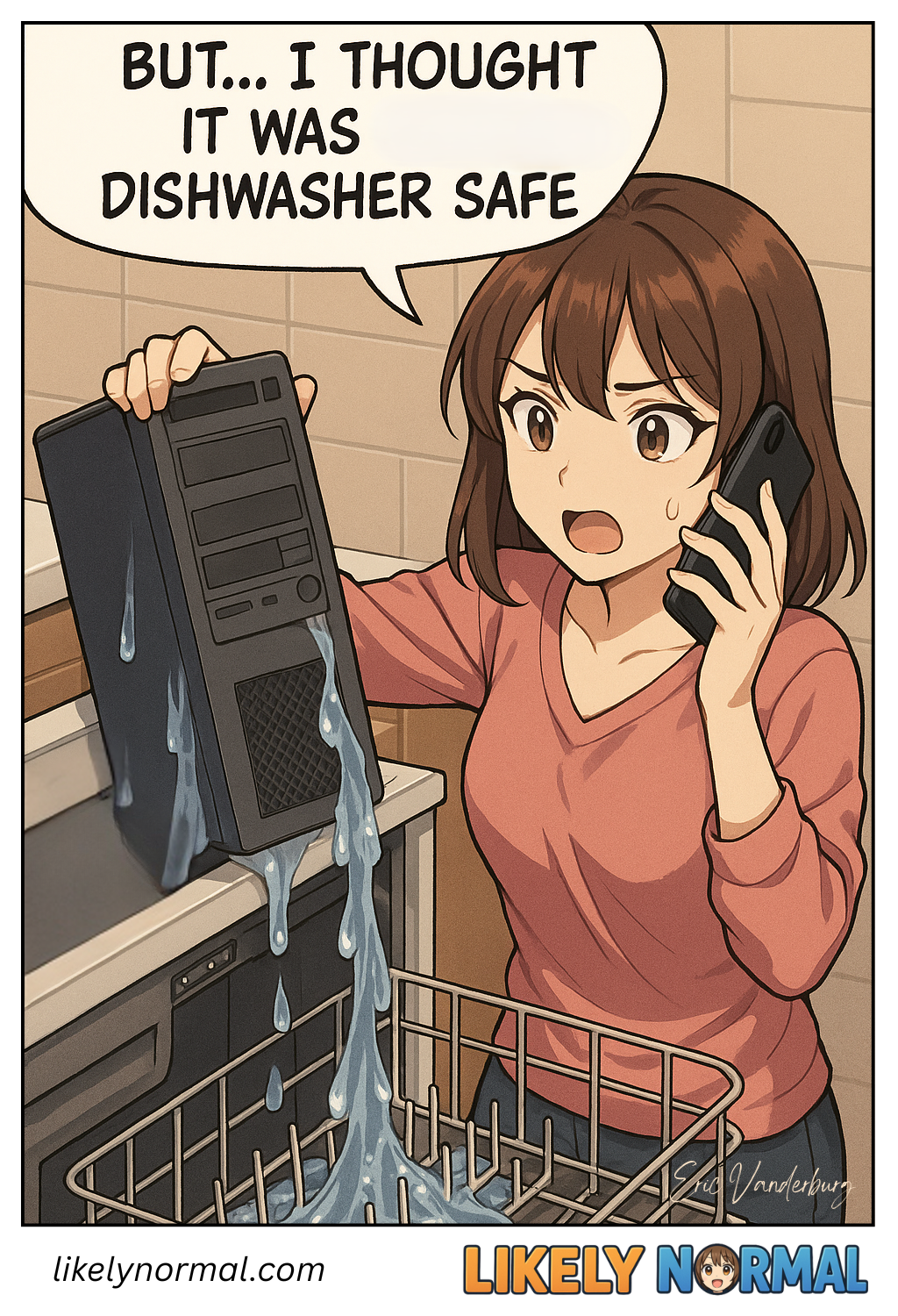Dishwasher Safe
Years ago, a rumor made its way across the internet that you could wash your keyboard in the dishwasher. In actuality, it was the keycaps that could be washed, but so many people with horribly grimy keyboards took the information at face value and ruined their keyboards in the process. This, however, is just the tip of the iceberg.
I’ve spent decades watching gamers wage war against their own expensive equipment, and let me tell you—it’s not pretty. The sheer creativity people display in breaking their rigs would be impressive if it weren’t so painful to witness. Take the classic “It’s Fine, Just Blow on It” repair method, where instead of diagnosing an overheating GPU like a rational human, they treat it like an old Nintendo cartridge, huffing directly onto the circuitry like they’re performing CPR. Spoiler: electronics don’t respond well to human breath, and now their $1,200 graphics card is a fancy doorstop.
Then there’s the airflow situation—or complete lack thereof. Some folks treat their PC case like a storage locker, cramming it with action figures, tangled cables, and enough dust bunnies to start a petting zoo. When their machine inevitably starts thermal throttling like an asthmatic marathon runner, they’re somehow shocked. “Why’s my game stuttering?” Because your PC is suffocating, genius. Open a window, clear some space, or at least stop using it as a coaster for your energy drinks.
And let’s not forget the overclockers—those brave, foolish souls who watched a 30-second YouTube tutorial and now think they’re hardware engineers. They crank voltage sliders to levels that would make a power plant nervous, ignore every warning that pops up (including the ominous “Are you sure?”), and then act baffled when their system crashes mid-game. “Must be a driver issue,” they mutter, as if their BIOS isn’t actively weeping.
Water-cooling enthusiasts are another special breed. They dive headfirst into custom loops with the confidence of someone who’s never experienced liquid damage, only to learn the hard way that “leak testing” isn’t just a suggestion. Watching coolant drip onto their power supply in slow motion is like watching a horror movie where you already know the ending—yet they still scream when the sparks fly.
Then there are the USB abusers, the people who treat their ports like a game of “How many devices can I chain before reality glitches?” Between the RGB keyboard, mouse, headset, mousepad, cup warmer, and “gaming” mini-fridge, their motherboard is basically running a power grid. When it finally gives up and bricks itself, they blame the manufacturer—not the fact that they were basically trying to run a Best Buy from a single PCIe lane.
And of course, we can’t ignore the “I’ll update later” crowd, who treat Windows updates like a nagging parent rather than, you know, critical system maintenance. After months of ignoring every security patch, they’re somehow shocked when their PC gets hijacked by malware that turns their RGB into a rave strobe light. “Why does tech hate me?” it’s not tech’s fault—you basically left your front door wide open with a sign that said “Hackers Welcome.”
At the end of the day, the lesson is clear: technology is a tool, not a stress ball. Treat it with a shred of respect, or at least pretend to, unless you enjoy the smell of burning capacitors and the sound of your own despair. And when your rig finally gives up the ghost, just remember—you didn’t fail tech. Tech failed to survive you. Now excuse me while I go watch another poor soul try to fix their liquid-cooled disaster with a hairdryer. This is entertainment gold.

Discussion ¬